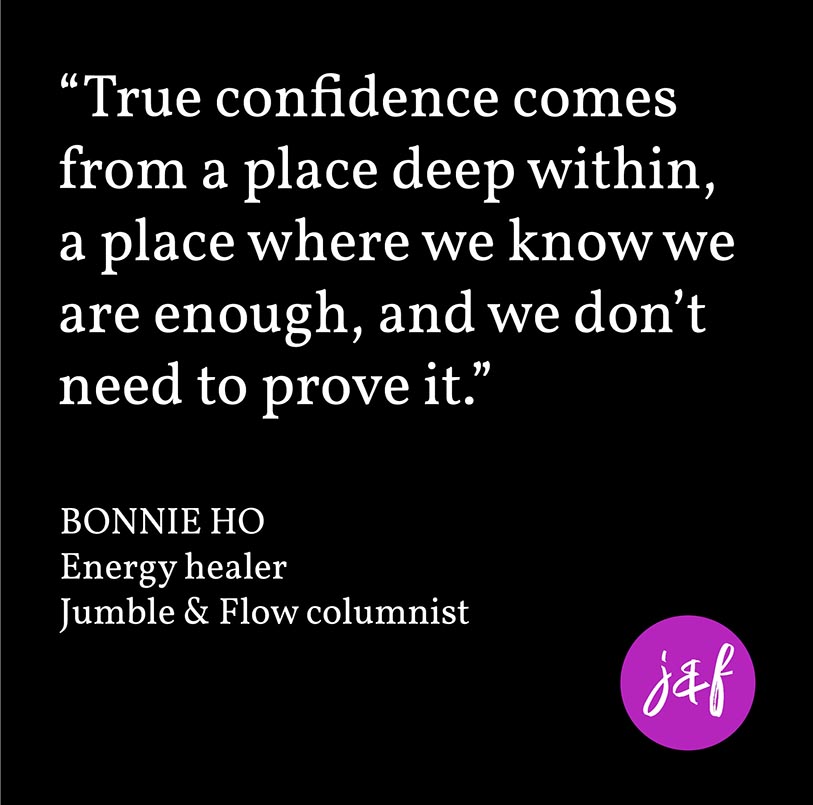
Why “fake it til you make it” is bad advice and what to do instead
For the first 30-some-odd years of my life, I was faking it. Lacking experience and, therefore, confidence in myself and my work, I grasped tightly to the advice I’d been given: “Fake it ’til you make it.” I needed to make it, you see. At 26 years old, I was still at the beginning of my career when my mother announced over breakfast that there was no way I would ever be a leader. Proving her wrong by being as successful as possible became an all-consuming goal.
If you’ve never come across this idea before, it’s often told to young professionals just starting out in their careers. The advice is meant to encourage you to do whatever it takes to succeed, even if it scares you—the theory being that if you continue to fake it, you will make it. Eventually real confidence will replace the fake stuff, and you’ll become successful in your chosen career.
And, honestly? The advice works. I faked it, and I made it. By my early 30s, I had been promoted to heights I never expected for myself, and I had the LinkedIn byline to prove it. So, if it works, what beef could I possibly have with “faking it”?
When “fake it till you make it” falls apart
I had built my career on the foundation of this advice when I landed a job at a small research company. It seemed like the perfect fit: I would be heading up both the marketing AND research departments, which were areas I had experience in. I would be writing research papers. And, on top of everything, I’d be expected to present at conferences about my research.
This was the “F*&k You” I had been looking for. To everyone in my life who didn’t believe in me, I was finally going to be a big deal. My ego loved it. I was finally someone people looked up to. Respected. I would finally get the attention I deserved.
Things went fine at first. I got all sorts of congratulations for my first research paper. Support from old colleagues and friends poured in. As the weeks went by, the date of my first conference presentation edged closer. I was anxious.
I was born shy, and I’ve wrestled social anxiety for much of my life. As the presentation got closer, my anxiety flared. I tried reasoning with it, “Please don’t. Not now.” When that didn’t work, I fed myself more motivational quotes to manufacture that “fake it till you make it” confidence I had used so many times before. “Feel the fear, and do it anyway.” “Stretch out of your comfort zone.” “You can do anything you set your mind to.”
When the conference day arrived, I got my butt up there, and I gave my presentation. I did fine. I congratulated myself, and thought, “Well, at least it’ll be easier next time.” It wasn’t. The next time, the same extreme anxiety hit me. Once again, I took another hit of motivational quotes in search of that fake-it confidence high. Unfortunately, just like any drug, the relief didn’t last. I came crashing down. The more I tried to hype myself up, the more tired I got.

This job had me “faking it” to all new limits. Challenge after challenge arose, and I pressed on. When competitive colleagues tried to overshadow me and my work, I faked harder. I was going to make it.
Anxiety built and built. There were times when I felt frozen by stress. But, my mind kept telling me to keep going, to keep pushing. Through all of this, I got a raise, and a staggering promotion. I was made General Manager of the research company. My ego felt vindicated: I had made it.
But, the feelings of victory did not last. A colleague who had also been vying for the GM position set out to undermine me constantly. Nothing was getting done and I was under immense stress and anxiety. I wasn’t in my new position long when I realized I couldn’t do it anymore. I had to get out. I resigned from the position and company only a couple of months after my promotion.
Fake confidence makes a fake you
Looking back, all of the anxiety I felt was trying to wake me up. It wanted me to know that I was becoming an inauthentic version of myself. My ego had taken over and I had become competitive and insensitive, often manipulating situations in my favor. I was becoming someone I did not like. All that fake confidence meant I was ignoring my real emotions. Since our real emotions are our path to our truest self, I ended up taking a path to a fake self.
Don’t get me wrong. I understand that when you are starting out in anything, and you don’t know what you’re doing, there is a certain amount of simply going through the motions, or faking it, as a way to learn. A first job. The first time you buy a car. A first… well, just about anything.
But, there’s a difference between going through the motions to learn and embracing fakeness as a way of life. As I look back, I can see how I lost myself in the “faking” and how I ended up internalizing some harmful, false beliefs.
Here are the false beliefs I accidentally internalized while “faking it” and how I’ve been de-programming them from my energy since.
Fake-it false belief #1: It’s OK to ignore your feelings
Fake it till you make it says: “Feel fear or anxiety? Ignore it. Cover it up and simply pretend it’s not there.”
All feelings are trying to tell us something. If you think about it, when you’re just starting out it is perfectly normal to feel like you don’t know what you’re doing, and therefore to feel uneasy. Instead of allowing ourselves to feel uneasy, “fake-it” advice tells us to ignore our hesitations, and keep going without resolving what our feelings may be trying to tell us. When we do this, however, we miss the nuance and wisdom of those emotions. We lump anything from nervousness to fear to anxiety in one big pool, called “bad emotion.” We assume that all “bad emotion” is fear. And, according to every motivational poster ever printed, fear must be overcome.
A new path is always a bit scary, so if one gets nervous jitters doing something new, it is understandable. But if someone gets major anxiety, that’s something different altogether. I find I get major anxiety when I force myself to do something I don’t want to do.
When I look back on myself in the General Manager role today, I can see that I was completely in my ego. I pursued the role for all of the wrong reasons. I wanted to spark envy in others, and to prove my mother wrong. My body knew I was going down a not-so-good path. My anxiety was my body’s way of warning me to stop and take a look at myself.
Fake-it false belief #2: Success is better than your true authentic self
Fake it till you make it says: “As long as you’re successful, it’s OK to not be true to yourself.”
I created a fake confident Bonnie. And the advice delivered. But, what was the cost? The cost was ME. I forced myself to do things, say things that weren’t true to who I am. I became ultra-competitive, conniving, and allowed my own jealousy to do things I’m not proud of.
Fake it till you make it is often advice given to those who have “Imposter Syndrome,” a condition when one feels they are a fraud in their life or job. Women are particularly susceptible to feeling Imposter Syndrome, but we’re told to simply keep going. I am going to challenge this advice: What if, instead, you asked yourself, “Is there something in my behavior or action that feels untrue to my authentic self?”
If you feel Imposter Syndrome, maybe it’s not that you don’t belong in your actual job. Maybe some of the ways you’re doing your job feel like a betrayal to who you are. Perhaps your company’s ethics are not congruent with your own. Or there is pressure to fit in, and you find yourself changing yourself to do so. As I look back on my own experience, it was right for me to be angry at my mother for what she said, because I am a leader. But I am not just any generic leader. My leadership path is completely unique to me, and my true self. And when I am leading from this place, I don’t feel like an imposter because I am 100% me.
Fake-it false belief #3: Fake confidence is better than admitting that you are insecure
Fake it till you make it says: “A mask of confidence is better than a lack of confidence.”
Don’t be insecure. Or, well, at least don’t let anyone know you’re insecure. That’s what we’re told, right? There is nothing wrong with feelings of insecurity. When we fake it, we’re only perpetuating our society’s fondness for hiding parts of us that may be construed as shameful. Until we stop encouraging people to put on masks, we won’t be able to understand where our feelings are coming from, and what they have to tell us.
Fake-it false belief #4: You will gain true confidence if you fake it enough
Fake it till you make it says: “Fake confidence will become real confidence when you’re successful.”
True confidence does not come from gaining promotions, accolades, and recognition from others. True confidence comes from a place deep within, a place where we know we are enough, and we don’t need to prove it.
Usually, our insecurities stem from childhood, or from unfair criticism we received when we were young and impressionable. This pain causes us to pursue accolades as a way to prove that we are, in fact, good enough. Bringing awareness to these wounds (and the unfairness of being wounded!), we can begin to find compassion for ourselves. This compassion blossoms into self-trust (“Hey, maybe I’m not so bad…”), and slowly our fears and insecurities loosen their hold on us. Even if nervousness arises with new challenges, there is a deep knowing that we are on the right path and we’ll be able to face it with courage.

What to do instead of “faking it”
Instead of telling young people just starting out to “Fake it till you make it”, here are some alternative things we can say:
- “It’s okay to be nervous and feel what you are feeling.”
- “It’s normal to feel insecure when you are doing something new. You will gain experience and learn. That’s what life is about.”
- “Always be true to yourself. Ask yourself what feels fake. Be honest with yourself. It’s okay if you need to make a change.”
- “You’re awesome just the way you are. Don’t feel like you need to prove yourself to anyone.”
And if you are in your own journey of feeling like an imposter, and want to live a life more aligned with the true you, here are a few tips for the road.
Follow your joy—you may find you
I don’t know why this is a secret. But I, for one, did not know this until a few years ago, so I don’t know if other people know either: When I am true to myself, it feels good. I mean, real good. Joy radiates from my body when I am authentic, on my path, and doing the things I feel passionate about.
Unless you had super hippie enlightened parents, most of us were told not to follow our joy. Instead, we’re told “That’s nice you’re feeling happy, but have you finished your math homework?” (Not to say math can’t be someone’s joy!) Because of this conditioning, we shut out the joy, and we’re left with a lost sense of who we really are.
Joy is a feeling—so you gotta feel things to feel it
If you are someone who has ignored your emotions for most of your life, this is a toughy. As someone who has gone on a damn journey to reconnect with my emotions, I can tell you joy is worth it.
If you’re like me, you tried to tamp down those pesky “bad” feelings. Sadness, heartbreak, grief, anger—I wanted to bottle them up or pretend they weren’t there. Thing was, I numbed out the “good” feelings too: joy, happiness, love.
I need the full range of my emotional system to guide me. Just as anger tells us when someone has crossed our boundaries, my emotions are my compass in this world. Without them, I lose touch with myself, and I stray from my path.
Your heart won’t fake you out
Our heart is the meeting point between our body (emotions) and our spirit (intuition). The concept of intuition can be a little foggy to some people, but I think most people can relate to following your heart. It is from my heart where I feel joy, and know I am being true to me.
You can sit with your heart each day, and ask:
- How do you feel today?
- Do you have a message for me?
- What can I do today to feel more joy?
Whatever answers come will guide you; you’ll be able to feel, hear, and live your truth. You may find sturdy confidence in your path, in your joy. And, that is never fake.



